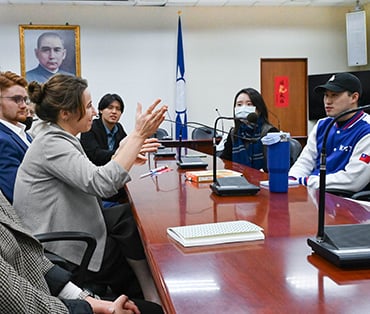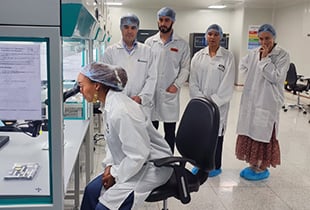How Top Schools Invest In Student Success
THIS GUIDE IS NO LONGER ACTIVE. For the current FP Guide, click here.
Johns Hopkins University School of Advanced International Studies
Embracing Technology and Experiential Learning in Global Dynamics
 Director of Graduate Education Brian McEntee exudes palpable enthusiasm when discussing the latest developments at Johns Hopkins University’s School of Advanced International Studies (SAIS). “Our recent and most exciting initiatives are all focused on technology and international relations,” he explains. “It’s an area with a lot of relevance and importance right now.”
Director of Graduate Education Brian McEntee exudes palpable enthusiasm when discussing the latest developments at Johns Hopkins University’s School of Advanced International Studies (SAIS). “Our recent and most exciting initiatives are all focused on technology and international relations,” he explains. “It’s an area with a lot of relevance and importance right now.”
The curriculum covers critical and contemporary topics, such as human rights, artificial intelligence, cybersecurity, and internet trust and safety, reflecting the significant impact of the digital era on global dynamics. “We are incorporating new efforts in these areas because that’s where international relations professionals will be focusing … and we feel our students need to be prepared for that environment,” McEntee explains.
This new emphasis strengthens the institution’s well-established reputation for providing a strong foundation in international economics, quantitative analysis, and security studies. SAIS graduates emerge with notable expertise in conflict management, cybersecurity, and strategy.

“Our goal is to equip students with skills to navigate uncertainty, including strong analytical abilities, ethics, leadership, and a deep understanding of regions and aspects of international relations.” –Brian McEntee, Director of Graduate Education, Academic Affairs, School of Advanced International Studies, Johns Hopkins University
Leveraging its Washington, DC, location, the school brings expertise from leading practitioners and policymakers directly into the classroom. “In the last year or two, AI and cryptocurrencies have become significant aspects of international relations,” McEntee notes. “Our ability to take advantage of the practitioners in the DC area who are on the cutting edge and bring them into the classroom is exciting.”
He also highlights the school’s practical experience opportunities. An upcoming study trip to Rwanda will explore technology and its ethical deployment in Africa. Meanwhile, the Staff Rides initiative provides opportunities for students to analyze historic military campaigns from the perspective of key decision-makers. Previous excursions have included important sites in London, Gibraltar, Morocco, France, and Washington, DC.
Practicum courses, such as the International Development practicum and SAIS Women Lead, involve students tackling real business problems in developing countries. The crisis simulation seminar immerses students in high-pressure scenarios to enhance their decision-making and critical-thinking skills. “These active experiences help students understand live issues in international relations, aligning their academic ideas with real-world practices,” McEntee emphasizes.
The school’s degrees balance interdisciplinary study with customization. The Master of Arts in International Relations, the school’s largest degree program, requires students to specialize in both a functional area — such as strategy or sustainability — and a regional focus — like Latin America or Asia. McEntee says this ensures “expertise across both regional and functional dimensions, which we think is important for an interdisciplinary approach to international relations.”
A Year of Global Exploration and Learning
In 2023-2024, around 200 Master of Arts in International Relations students took part in SAIS-supported travel, with 19 trips spanning five continents. Destinations included Brazil, Colombia, India, Kenya, Nigeria, Taiwan, South Korea, and Switzerland. These study trips and practicum courses addressed pressing global issues, such as climate change, human rights, and emerging technologies. By engaging with policymakers, diplomats, and regional experts, students gained hands-on experience and invaluable insights, enriching their studies and preparing them for influential careers on the global stage.
Johns Hopkins University School of Advanced International Studies
https://sais.jhu.edu
[email protected]
202-663-5700![]()
Contents
- How Top Schools Invest In Student Success
- George Washington University, Elliott School of International Affairs
- Rice University, School of Social Sciences
- Princeton University, Princeton School of Public and International Affairs
- Augusta University, Pamplin College of Arts, Humanities, and Social Sciences
- The Fletcher School at Tufts University
- Indiana University, Hamilton Lugar School of Global and International Studies
- Columbia University, School of International and Public Affairs
- Penn State University, School of International Affairs
- Texas A&M University, Bush School of Government & Public Service
- Georgetown University, School of Foreign Service
- University of Denver, Josef Korbel School of International Studies
- Yale University, Jackson School of Global Affairs
- George Mason University, Schar School of Policy and Government
- American University, School of International Service
- Seton Hall University, School of Diplomacy and International Relations
- Johns Hopkins University School of Advanced International Studies
